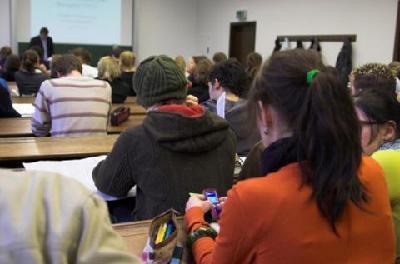
This is the VOA Special English Education Report.
Professors have lectured for centuries. But how effective is lecturing to students compared to working with them?
A new study compared two classes of a beginning physics course at the University of British Columbia in Canada. There were more than 260 students in each section. Both were taught by popular and experienced professors.
The study took place for one week near the end of the year. One class continued to be taught in the traditional lecture style. The other professor was replaced by two teachers. They had little teaching experience but received training in interactive teaching methods. The training was led by Carl Wieman, a Nobel Prize-winning physicist who leads a science education program.
There was almost no lecturing. The teachers put the students in small groups to discuss and answer questions. They gave them readings and quizzes to finish before class so they would come prepared to discuss the material.
Professor Wieman says before the experiment with these and other activities, test scores for both classes were the same.
CARL WIEMAN: "There was a great deal of careful data collected showing how identical the two sections, these two large sections of the class were beforehand. And this focused very much on looking at exactly what could be learned with the different methods from the classroom experience, the time when you have the maximum instructor interaction, or face-to-face interaction time."
Afterward, both classes took the same test. Students in the interactive class scored nearly twice as high as those in the traditional class. Attendance also increased that week.
Graduate student Ellen Schelew was one of the teachers. She says the methods they used are designed to encourage students to think like scientists.
ELLEN SCHELEW: "Their brains are turned on. They're thinking hard and they're really working through these problems. So even if they don't have enough time to complete a given problem, they are prepared to learn from the instructor feedback that always follows groups' tasks."
The study appeared in May in the journal Science. It seems to confirm earlier findings about lecturing to large classes. But some experts have criticized the way the study was done.
Both of the researchers who taught the class, Ms. Schelew and Louis Deslauriers, were also authors of the study. This could raise questions about whether their involvement might have influenced the results.
Professor Wieman is currently on leave from the University of British Columbia and the University of Colorado. He is the associate director for science in the White House Office of Science and Technology Policy.
He says research has shown better ways to teach based on evidence about how the brain learns. And he hopes more professors will learn that how someone teaches may be more important than who does the teaching.
And that's the VOA Special English Education Report. I'm Christopher Cruise.
British kids + online tutors in India = divided opinions
Meet some top students in the Intel Science Talent Search
Searching for better ways to teach math in US
(来源:VOA 编辑:崔旭燕)
